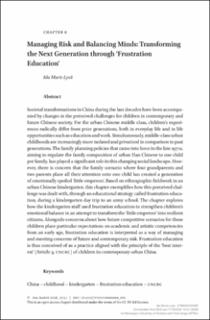| dc.contributor.author | Lyså, Ida Marie | |
| dc.date.accessioned | 2021-01-25T08:47:14Z | |
| dc.date.available | 2021-01-25T08:47:14Z | |
| dc.date.created | 2020-11-19T11:56:57Z | |
| dc.date.issued | 2021 | |
| dc.identifier.isbn | 978-90-04-44566-6 | |
| dc.identifier.uri | https://hdl.handle.net/11250/2724431 | |
| dc.description.abstract | Societal transformations in China during the last decades have been accompanied by changes in the perceived challenges for children in contemporary and future Chinese society. For the urban Chinese middle class, children’s experiences radically differ from prior generations, both in everyday life and in life opportunities such as education and work. Simultaneously, middle-class urban childhoods are increasingly more isolated and privatised in comparison to past generations. The family planning policies that came into force in the late 1970s, aiming to regulate the family composition of urban Han Chinese to one child per family, has played a significant role in this changing social landscape. However, there is concern that the family scenario where four grandparents and two parents place all their attention onto one child has created a generation of emotionally spoiled ‘little emperors’. Based on ethnographic fieldwork in an urban Chinese kindergarten, this chapter exemplifies how this perceived challenge was dealt with, through an educational strategy called frustration education, during a kindergarten day trip to an army school. The chapter explores how the kindergarten staff used frustration education to strengthen children’s emotional balance in an attempt to transform the ‘little emperors’ into resilient citizens. Alongside concerns about how future competitive scenarios for these children place particular expectations on academic and artistic competencies from an early age, frustration education is interpreted as a way of managing and meeting concerns of future and contemporary risk. Frustration education is thus conceived of as a practice aligned with the principle of the ‘best interest’ (Article 3, UNCRC) of children in contemporary urban China. | en_US |
| dc.language.iso | eng | en_US |
| dc.publisher | Brill | en_US |
| dc.relation.ispartof | Childhood Cultures in Transformation 30 Years of the UN Convention on the Rights of the Child in Action towards Sustainability | |
| dc.rights | Navngivelse 4.0 Internasjonal | * |
| dc.rights.uri | http://creativecommons.org/licenses/by/4.0/deed.no | * |
| dc.title | Managing Risk and Balancing Minds Transforming the Next Generation through ‘Frustration Education’ | en_US |
| dc.type | Chapter | en_US |
| dc.description.version | publishedVersion | en_US |
| dc.source.pagenumber | 121-137 | en_US |
| dc.identifier.doi | 10.1163/9789004445666_006 | |
| dc.identifier.cristin | 1849785 | |
| dc.description.localcode | © Ida Marie Lyså, 2021 | This is an open access chapter distributed under the terms of the CC BY 4.0 License | en_US |
| cristin.ispublished | true | |
| cristin.fulltext | original | |
| cristin.qualitycode | 1 | |

